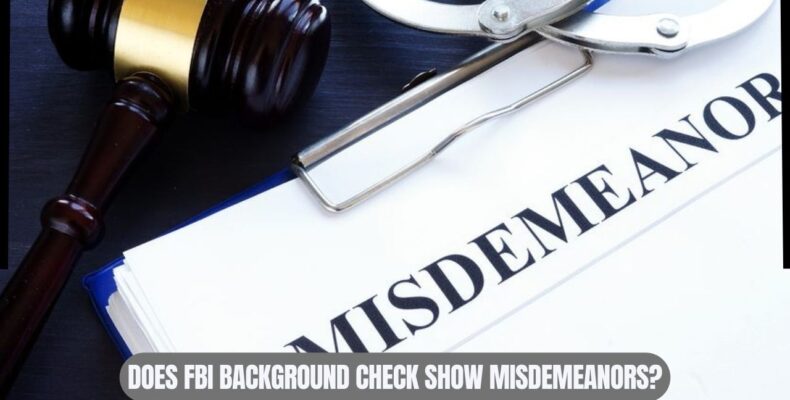Are you concerned about whether your misdemeanor convictions will appear on an FBI background check? Understanding what information these comprehensive checks reveal is crucial, especially for sensitive roles involving public trust or national security. This guide provides you with a thorough understanding of how misdemeanors are handled in FBI background checks. We’ll explore the factors that determine their inclusion, the time frame covered, and steps you can take to challenge inaccuracies. By the end, you’ll have the knowledge to navigate this process successfully and make informed decisions.
Key Takeaways:
- FBI background checks are comprehensive reviews of an individual’s criminal history, including felony and misdemeanor convictions, arrests, and pending cases.
- Misdemeanor convictions may appear on FBI background checks, depending on factors such as the severity of the offense, recency, and the purpose of the check.
- More severe misdemeanors involving violence, drugs, or theft are more likely to be reported, as are recent convictions within the past seven years.
- The time frame covered by an FBI background check can vary, but it typically goes back seven years for employment purposes and may extend further for sensitive positions involving national security or public trust.
- If you find errors or inaccuracies in your FBI background check results, it’s essential to take steps to challenge and correct them through the proper channels.
- Expunged or sealed misdemeanor convictions should not appear on FBI background checks, but the expungement or sealing process can vary by jurisdiction.
- Failing to disclose a misdemeanor conviction, even if it’s not reported on a background check, can be considered falsification and may have serious consequences.
- In some cases, you may be able to appeal a decision if you’re denied employment or a security clearance due to a misdemeanor conviction by providing additional mitigating information.
Learn more about what an FBI background check includes and how it can impact your record by visiting our detailed guide on the comprehensive contents of an FBI background check.
What Is an FBI Background Check?
An FBI background check, also known as an Identity History Summary Check, is a comprehensive review of an individual’s criminal history records maintained by the Federal Bureau of Investigation (FBI). These checks are typically required for employment in federal agencies, law enforcement, the military, and other positions that involve national security or public trust.
The primary purpose of an FBI background check is to verify an individual’s suitability for sensitive roles by examining their criminal history, including any arrests, convictions, or pending cases at the federal level.
What Shows Up on an FBI Background Check?
FBI background checks can reveal a wide range of information from an individual’s criminal history, including:
Felony Convictions: Any felony convictions, regardless of the offense or when it occurred, will appear on an FBI background check.
Misdemeanor Convictions: Misdemeanor convictions may also be reported, depending on factors such as the severity of the offense, the jurisdiction where it occurred, and the purpose of the background check.
Arrests and Pending Cases: Arrests and pending cases, even without convictions, can be included in an FBI background check. However, the level of detail provided may vary based on the reporting agency and the circumstances.
Infractions: Certain infractions, such as traffic violations or dismissed cases, may or may not be included in an FBI background check, depending on the reporting agency and the purpose of the check.
For a step-by-step process on verifying your records, explore our instructions on how to check an FBI apostille background check, ensuring you have all necessary documents authenticated.
Do Misdemeanors Show Up on FBI Background Checks?
The inclusion of misdemeanors on FBI background checks is not a straightforward yes or no answer. Several factors determine whether a misdemeanor conviction will appear, including:
Severity of the Offense: More severe misdemeanors, such as those involving violence, drugs, or theft, are more likely to be reported on an FBI background check.
Recency: Recent misdemeanor convictions are more likely to appear than older ones, especially if they occurred within the past seven years.
Purpose of the Background Check: The purpose of the FBI background check plays a role in determining what information is included. Checks for sensitive positions like law enforcement or national security may reveal more details than those for less critical roles.
It’s important to note that even minor misdemeanors have the potential to be reported, especially if they are relevant to the position or clearance being sought.
If you need your records urgently, find out how to expedite your FBI background check for quicker results, minimizing delays and ensuring timely access to your information.
How Far Back Do FBI Background Checks Go?
The time frame covered by an FBI background check can vary depending on the purpose of the check and the laws and regulations governing the specific industry or agency. In general, FBI background checks can go back as far as an individual’s 18th birthday or the maximum allowed by state and federal laws.
For most employment and licensing purposes, FBI background checks typically cover the past seven years. However, for sensitive positions involving national security or public trust, the background check may extend further back or even encompass an individual’s entire adult life.
Challenging Inaccurate FBI Background Check Results
If you find errors or inaccuracies in your FBI background check results, it’s essential to take steps to correct them. The process typically involves:
Obtaining a copy of your Identity History Summary from the FBI.
Reviewing the report carefully and identifying any errors or inaccuracies.
Gathering supporting documentation to prove the inaccuracies, such as court records or police reports.
Submitting a challenge to the FBI’s Criminal Justice Information Services (CJIS) Division, along with the supporting documentation.
Following up with the relevant agencies to ensure the corrections are made and reflected in future background checks.
Frequently Asked Questions
Q1: Do expunged or sealed misdemeanors show up on FBI background checks?
A1: Expunged or sealed misdemeanor convictions should not appear on FBI background checks. However, it’s important to note that the expungement or sealing process can vary by state and jurisdiction, and there may be instances where the information is still accessible to certain agencies or for specific purposes.
Q2: Can I be denied employment or a security clearance because of a misdemeanor conviction?
A2: It’s possible to be denied employment or a security clearance due to a misdemeanor conviction, especially if the offense is relevant to the position or clearance being sought. However, many factors are considered, including the nature and severity of the offense, the time that has passed, and any mitigating circumstances.
Q3: How can I obtain a copy of my FBI background check?
A3: You can request a copy of your Identity History Summary from the FBI by submitting a personal review request and following the required procedures. This typically involves providing personal information, fingerprints, and payment of the applicable fees.
Q4: What should I do if I have a misdemeanor conviction that is not reported on my FBI background check?
A4: If you have a misdemeanor conviction that is not reported on your FBI background check, it’s important to disclose it to the relevant parties, such as potential employers or agencies conducting the check. Failing to disclose a conviction, even if it’s not reported, can be considered falsification and may have serious consequences.
Q5: Can I appeal the decision if I’m denied employment or a security clearance due to a misdemeanor conviction?
A5: Yes, in many cases, you can appeal the decision if you’re denied employment or a security clearance due to a misdemeanor conviction. The appeals process typically involves providing additional information or documentation that may mitigate the impact of the conviction or demonstrate your suitability for the position or clearance.

